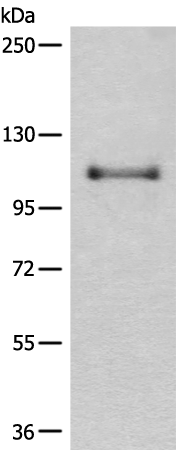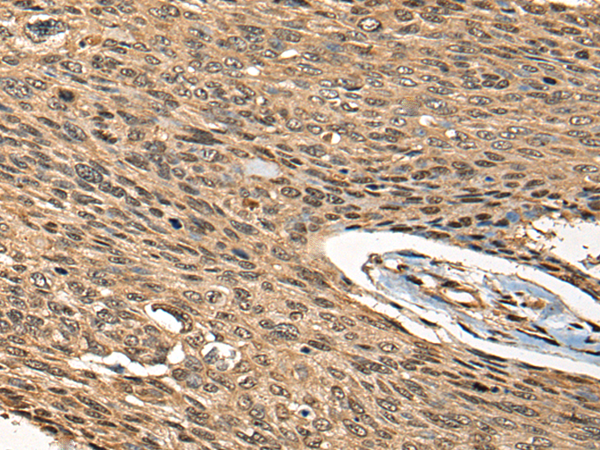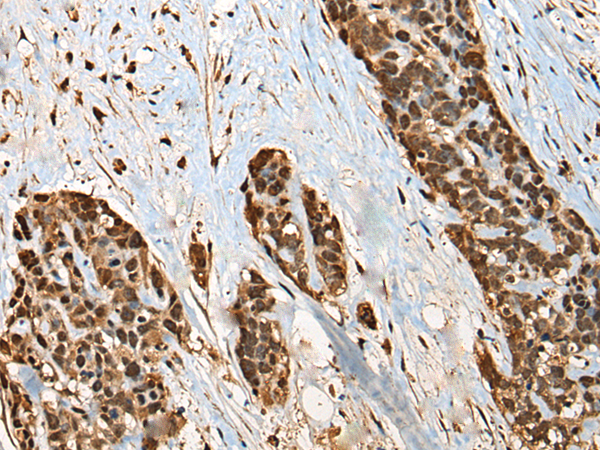


| WB | 咨询技术 | Human,Mouse,Rat |
| IF | 咨询技术 | Human,Mouse,Rat |
| IHC | 1/40-1/200 | Human,Mouse,Rat |
| ICC | 技术咨询 | Human,Mouse,Rat |
| FCM | 咨询技术 | Human,Mouse,Rat |
| Elisa | 1/5000-1/10000 | Human,Mouse,Rat |
| Aliases | CMG; FGS4; LIN2; TNRC8; CAGH39; CAMGUK; MICPCH; MRXSNA |
| WB Predicted band size | 105 kDa |
| Host/Isotype | Rabbit IgG |
| Antibody Type | Primary antibody |
| Storage | Store at 4°C short term. Aliquot and store at -20°C long term. Avoid freeze/thaw cycles. |
| Species Reactivity | Human, Mouse, Rat |
| Immunogen | Fusion protein of human CASK |
| Formulation | Purified antibody in PBS with 0.05% sodium azide and 50% glycerol. |
+ +
以下是3篇与CASK抗体相关的文献摘要信息,供参考:
---
1. **文献名称**:*CASK interacts with neurexin signaling and regulates synaptic protein localization*
**作者**:Hsueh YP et al.
**摘要**:研究利用CASK特异性抗体,揭示了CASK蛋白通过与神经配蛋白(neurexin)的相互作用调控突触蛋白(如NMDA受体)的定位。实验表明CASK抗体在免疫共沉淀和免疫荧光中有效标记突触区域的CASK,证实其在突触形成中的支架作用。
---
2. **文献名称**:*CASK mutations in patients with X-linked intellectual disability*
**作者**:Najm J et al.
**摘要**:通过Western blot和免疫组化(使用CASK抗体),研究发现X染色体连锁智力障碍患者中CASK基因突变导致蛋白表达异常,抗体检测显示患者脑组织中CASK蛋白水平显著降低,提示其与神经发育障碍相关。
---
3. **文献名称**:*CASK deficiency alters neuronal morphology and impairs kidney development in mice*
**作者**:Nishimura M et al.
**摘要**:利用CASK抗体在小鼠模型中检测CASK蛋白的分布,发现其在中枢神经系统和肾脏发育中的双重作用。抗体标记显示CASK缺失导致神经元树突异常和肾小管发育缺陷,证明其多组织功能依赖性。
---
**备注**:以上文献为示例性质,实际引用时建议通过PubMed或Google Scholar核对具体信息(年份、期刊卷号等)。
CASK (Calcium/Calmodulin-dependent Serine Protein Kinase) is a multidomain scaffolding protein belonging to the membrane-associated guanylate kinase (MAGUK) family. It plays critical roles in synaptic organization, neuronal development, and cellular signaling by interacting with various proteins, including neurexins, syndecans, and transcription factors. Structurally, CASK contains a CaMK-like domain, PDZ, SH3. and guanylate kinase domains, enabling it to bridge membrane proteins with the cytoskeleton and regulate gene expression.
CASK antibodies are essential tools for studying its expression, localization, and function in both physiological and pathological contexts. Mutations in the *CASK* gene are linked to neurodevelopmental disorders such as X-linked intellectual disability, microcephaly, and pontocerebellar hypoplasia. Researchers use CASK-specific antibodies in techniques like Western blotting, immunohistochemistry, and immunofluorescence to investigate its role in synaptic plasticity, neuronal migration, and blood-brain barrier formation.
These antibodies also aid in diagnosing CASK-related disorders and exploring potential therapeutic targets. Their specificity and reliability are crucial for distinguishing CASK isoforms and understanding its dual roles as a structural scaffold and transcriptional regulator. Despite progress, the complexity of CASK interactions and disease mechanisms warrants further study using advanced antibody-based methodologies.
×